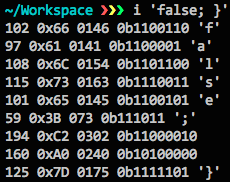I was not expecting that diff.
It all started around 4 p.m. in the afternoon of December 29th. It was a typical day at Talkdesk. But a gf, followed by a gm origin/master (I use aliases courtesy of prezto) would change it all.
After merging, I ran our front-end specs and got way too many errors. I started discussing with @quimrstorres possible reasons for it to have happened as I happened to know he had been messing around with master not long before the strange event.
We quickly realized something must be very off for that to be happening. I finally narrowed my search down to one file (bare with me, I don’t recall exactly how, but an error of some sort must have happened which allowed me to track that file). The line was this one:
if (_.isUndefined(this.collection)) { return false; }Now, comes the weird part. I have been using Sublime as my main text editor (since I am yet to be converted to Vimism — or The Church of Emacs for that matter) and I had been getting weird syntax errors in Ruby near curly braces. I actually thought the error involved the curly braces themselves (some weird encoding I was inadvertently feeding Sublime with).
I would (wait for it…) carefully re-write my curly braces (and some characters near them, mostly spaces) and everything would then work as expected. I didn’t know why this was happening in the first place or how I was being able to solve it, but careful re-write could not be the answer.
So, getting back to that line. Guess what? Yep, that’s right, I carefully re-wrote the curly braces surroundings and everything just worked. We were now even more curious, so we diffed it and got the following:

We were now pretty convinced something related to character enconding must be going the wrong way. But what could it be?
This is strange.
I remembered something else. There was this interesting little program I had found to be very useful in situations such as this one. Again, I don’t recall exactly why we were using it when I was first introduced to it by @tjsousa. Meet i. This utility program (available in Homebrew via brew install iprint) returns a set of possible representations (decimal, hexadecimal, octal and binary) for the characters in a given string.
We gave it a shot. First, the sane line:

Then, the ill-behaved one:

The space character (hex value 20) had been replaced by two other bytes. There it was! But what did C2 A0 mean, after all?
Turns out, in UTF-8 this translates to the non-breaking space character. This was our chameleon character. Instead of the normal space, me and @quimrstorres were inadvertently inserting nbsps to our code. But why?
In Mac OS X Yosemite, you are able to insert the nsbp character by hitting option + space. This is also our shortcut to bring up Alfred. So, most of the time, when we hit the poisonous combo (responsible for generating nsbps), we get Alfred instead. But when we have another key in the mixture (namely shift) we effectively silence Alfred, letting Mac OS X interpret the unintended character. And that’s exactly what happens when we have to write a curly brace. Out of habit, we will often times write a space before a curly brace (be it a closing } or opening one {), which in our qwerty-based fingers will sometimes cause us to be pressing shift even before we need to, leading to the following:
shift + (right) option + space(notice the unnecessary shift+option)shift + (right) option + 9(for the closing curly brace, present in the snippet that caused all this)
I looked for a way to solve this permanently in OSX and found this stackoverflow answer. Basically, you just add the following key-bind to your ~/Library/KeyBindings/DefaultKeyBinding.dict file (you might not have one yet):
{
"~ " = ("insertText:", " ");
}
In this way, I get completely rid of nbsps in all my applications. Other less invasive options include highlighting weird characters (this is what @quimrstorres decided on, using Vim) or defining application-specific key-bindings (Sublime allows this, for example).
Stick around for the next post!